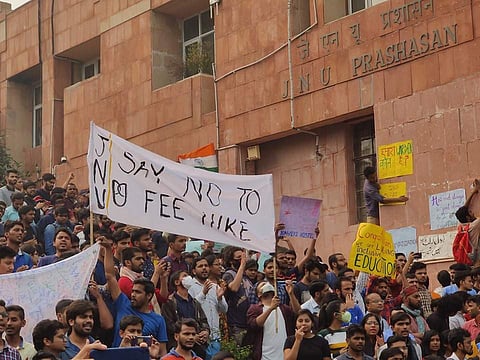

At a time when the MHRD is desperately is trying to solve the JNU protests by holding talks with the students and the VC, the university administration has now fired a new salvo — they have filed a contempt petition against the students. In what might seem like an untimely move, the JNU admin represented by advocate Monika Arora, has approached the Delhi High Court and filed a contempt petition claiming that 9 student unionists, including current JNUSU President Aishe Ghosh, General Secretary Satish Yadav and former president N Sai Balaji should be held in contempt of the Delhi HC order that prohibits them from protesting within 100 metres of the university administration block.
The notice has shocked and angered the students who have been engaged in a dialogue with the MHRD, second day in a row. The petition which is believed to be filed in the last week and the notice has asked the respondents to appear for a hearing on December 11 at 10 am. However, the notice has reached a few students only after the time of the hearing. The others are yet to receive it. Understandably, the students are irate. "This is a betrayal by the administration," says Sai Balaji. "On one hand, the MHRD is holding negotiations and on the other, the Vice-Chancellor has filed a petition against us. We will not back down," he says.
But did the students really go to the administration block? Satish Yadav says that the students had gone to the administration block only to have a dialogue with the administration about the current situation. "In order to meet the members of the administration, it is obviously necessary for us to go the block. Now, the university is using this evidence to threaten us," he says.
The JNU had approached the Delhi High Court and filed a writ petition in 2017 against the Commissioner of Police, DCP South, Vasant Vihar ACP, Inspector, Vasant Kunj SHO and the JNUSU about how the police weren't responsive and the protests on campus had created an unlawful atmosphere. The court had ordered that protests must be held in a peaceful manner at the Sabarmati lawns and the police must enter on the evidence of obstruction to ingress/egress to the Administrative Building, being provided by the authorities, which may be in the form of CCTV footage
Since the respondents were informed late about the hearing, none of them was able to attend the hearing. It is likely that this will be followed by a subsequent contempt petition by the court. "Since it is a sub judice matter, we'll have to talk to the lawyer and decide what the next step will be," says Satish. The students of the university have been protesting for close to two months against the new fee hike that was proposed by the administration.
